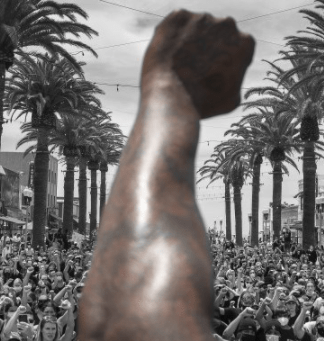
Freedom is in the Eye of the Beholder
By Jasmine Williams, Staff Writer
What is Freedom? Some common definitions include the following:
- the state of not being imprisoned or enslaved.
- the power or right to act, speak, or think as one wants without hindrance or restraint.
- absence of subjection to foreign domination or despotic government.
| By these definitions, have Black people in this country ever truly known freedom? Although our bodies are no longer property, collectively Black people still disproportionately encounter hardships that our counterparts do not endure at the same intensity. The 13th amendment literally creates a legal loophole that allows those convicted of a crime or entangled in the criminal system, to be treated as slaves– based on socially constructed laws that are disproportionately enforced leading to mass incarceration of Black men and women. Neighborhoods and schools are policed and surveilled. Black youth are criminalized and left uninvested in by their communities. Although our bodies are no longer property, anti blackness shows its ugly face not only through public attitudes–but when upheld through laws and policies that further discriminate huge groups of marginalized folks. |
But still we resist. We gather at churches, in community, at family reunions and cookouts. We share stories, resources and build relationships. We discuss and strategize for solutions. We learn to love each other and ourselves in a world full of confusion and hate. We work together to follow the steps of freedom fighters before to achieve liberation. We create our own freedom.
Although our bodies are no longer property in the form of chattel slavery, just over 150 years ago they still were. Freedom at that time looked like opportunity. The concrete legal decision that lead to emancipation of slaves in the United States in 1865 marked the beginning of a hope for free life for our ancestors. Because the news of that decision was withheld from thousands of slaves in order to further exploit them for free labor–today we celebrate a day that stands as a mark of true freedom. On June 19th of 1865 our ancestors marched to Southern states like Texas and North Carolina to inform their brothers and sisters that the Civil War had ended and to announce Black people were “free”.
Whether the concept of freedom is ideological or an actual reality for Black folks, we cannot undermine Juneteenth as a monumental moment in history for not only our ancestors but for the movement of Black Liberation. On June 19th after years of bondage and inhumane treatment and labor, Black people in the U.S were free to embark on the journey of pursuing the so called American Dream; Although unforeseen barriers would ultimately limit Black people’s access to housing, land ownership and jobs–the emancipation of slaves meant that there was a silver lining in a thick cloud of white supremacy and provided our people with hope. Hope that in a country that promises freedom for all– that equality was not too far behind. That we would be able to enjoy the very fruits of our own labor that built the country that so blatantly disrespected and neglected even the most basic human needs of Black people.
Perhaps for some, the day remains a painful reminder of a fight still unfinished; however more commonly for Black people, Juneteenth is acknowledged as one of the oldest known holidays honoring the ending of slavery in America– a bitter sweet Black historical landmark which is celebrated across the country.
Black people around this time gather in community, listen to music, host events to acknowledge a pain that is etched into our history and the inevitable triumph that pursued. Today we celebrate the day we took our fate into our own hands and freed our brothers and sisters with the information of the ending of our bondage as a people. There is something significant about freedom that comes not at the hands of the state, but in our own hands . As our ancestors, we have to be willing to do whatever it takes to cross the unfamiliar terrain in order to have those freedom conversations with each other. Our cultural celebrations represent a resistance because despite the oppressive structures put in place to drain us, we resist by building community and holding fast to our culture. That type of spiritual resistance is important but we also have to push ourselves to pursue the type of resistance that comes from organizing, strategizing together, and protecting one another— then and only then our freedom question might just finally have an answer.
